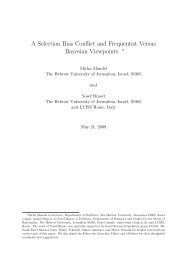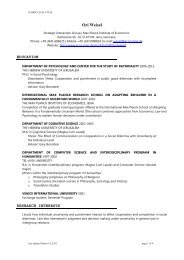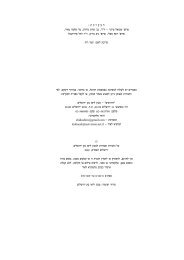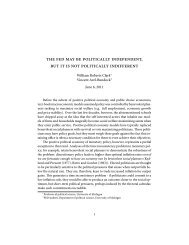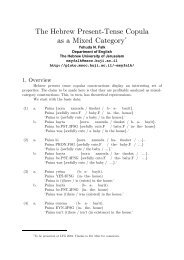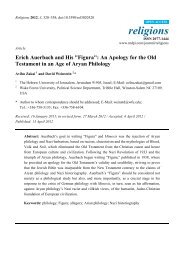Transitive verbs with non-accusative alternation in ... - Pluto Huji Ac Il
Transitive verbs with non-accusative alternation in ... - Pluto Huji Ac Il
Transitive verbs with non-accusative alternation in ... - Pluto Huji Ac Il
Create successful ePaper yourself
Turn your PDF publications into a flip-book with our unique Google optimized e-Paper software.
62<br />
Rivka Halevy<br />
of the mean<strong>in</strong>g of the construction frame as a holistic cognitive unit (cf.<br />
Goldberg 1995). In this view, the construction, <strong>with</strong> its specific mean<strong>in</strong>g –<br />
as will be described – exists <strong>in</strong>dependently of the <strong>in</strong>dividual <strong>verbs</strong> that may<br />
occur <strong>in</strong> it.<br />
The general claim is that the <strong>accusative</strong> construction is <strong>in</strong> many respects<br />
the unmarked construction or default form, while the prepositional<br />
construction, <strong>with</strong> an <strong>in</strong>direct object which is not part of the valency of the<br />
verb, is the marked construction. In order to ma<strong>in</strong>ta<strong>in</strong> this claim, the<br />
analysis will consider the pert<strong>in</strong>ent semantic properties of the central<br />
participants, viz., the actor (A) and the object (O), (Section 2), and the<br />
verbal action (V) (Section 3). Each of the components of the transitive<br />
event that will be discussed <strong>in</strong>volves a different facet of the effectiveness or<br />
<strong>in</strong>tensity <strong>with</strong> which the action is transferred from one participant to<br />
another, as well as a different viewpo<strong>in</strong>t on the event structure.<br />
Trigger<strong>in</strong>g a more specific focus on the speaker’s or observer’s<br />
viewpo<strong>in</strong>t, the present study offers a new cognitive approach to the<br />
phenome<strong>non</strong> of transitivity <strong>alternation</strong> <strong>in</strong> Hebrew (Section 4). This view<br />
corresponds to a great extent to the construction grammar approach to the<br />
Ø/a transitivity <strong>alternation</strong> <strong>in</strong> Spanish as advocated by Delbecque (1999a,<br />
1999b, 2002).<br />
A close exam<strong>in</strong>ation of the syntactic behavior of the set of <strong>verbs</strong> to be<br />
classified below (Section 1) can probe for l<strong>in</strong>guistically relevant aspects of<br />
their mean<strong>in</strong>g. In Section 5 I shall discuss the relevance of the notion of<br />
‘contact’ to the syntactic behavior of the transitive <strong>verbs</strong> <strong>in</strong> question. It will<br />
be argued that the notion of ‘contact’ is relevant not only to the syntactic<br />
behavior of the transitive <strong>verbs</strong> participat<strong>in</strong>g <strong>in</strong> the ‘et/be- <strong>alternation</strong>, but is<br />
also compatible <strong>with</strong> the viewpo<strong>in</strong>t on the event.<br />
With regard to the lexical dimension, I will suggest that the prepositional<br />
construction plays a crucial role <strong>in</strong> creat<strong>in</strong>g metaphorization, and that <strong>in</strong><br />
languages <strong>with</strong> a formal mechanism of transitivity <strong>alternation</strong> – such as<br />
Hebrew and Spanish – it is a device denot<strong>in</strong>g verbal polysemy (Section 6).<br />
As <strong>in</strong>dicated above, a similar type of syntactic mechanism, traditionally<br />
known as the ‘prepositional and the <strong>non</strong>-prepositional <strong>accusative</strong><br />
<strong>alternation</strong>’, is available <strong>in</strong> Spanish, but lack<strong>in</strong>g <strong>in</strong> English. Consider the<br />
follow<strong>in</strong>g Spanish and Hebrew examples (1a,b), and their English<br />
equivalent (1c):<br />
(1) a. mataron { Ø/a} moros y judíos<br />
killed-3PL {Ø/to} Moors and Jews<br />
(history books; taken from Delbecque 2002)<br />
b. hem hargu {Ø/be-} maurim ve-yehudim



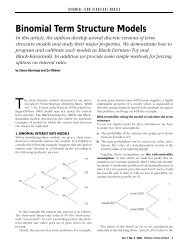
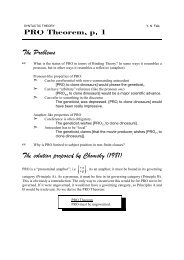
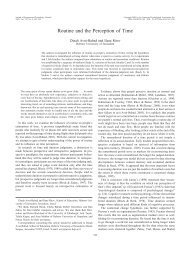
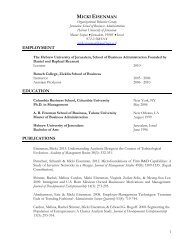
![CV [PDF] - Pluto Huji Ac Il](https://img.yumpu.com/18174585/1/190x245/cv-pdf-pluto-huji-ac-il.jpg?quality=85)
